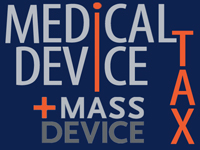
It’s time for medical device makers to begin preparing for the 2.3% medical device tax in their valuations and negotiations, according to former FDA reviewer and consultant Adam Piotrowski.
Stakeholders should leverage the tax in their projections and negotiations with the industry, especially during mergers and acquisitions, notwithstanding the ongoing push in Washington to repeal the levy.
"With specific knowledge of the tax and its potential impacts to a firm’s income statements, buy-side deal-makers may be able to leverage that knowledge over under-prepared counterparts to drive attractive purchase multiples," Piotrowski wrote in an op-ed for Business Insider. "Sellers may also be able to find an advantage by developing familiarity and understanding of the tax. Being able to demonstrate that management has successfully implemented strategic initiatives to counteract the tax, resulting in minimal interruption to (or even improvement in) operating efficiency can support higher valuations and purchase multiples."
The IRS has yet to issue final rules on the tax, creating a level of uncertainty that savvy negotiators can use to their advantage, he added.
"The complexity and uncertainty surrounding the device tax creates a competitive advantage that favors deal-makers who maintain up-to-date knowledge about how the latest developments will affect products and influence their valuations," according to Piotrowski.
The IRS released initial guidance in February on the implementation of the device tax, carving out some exemptions for early-stage devices and providing a little clarity on fears of a double tax for contract manufacturers, importers and component manufacturers.
The device tax, which became law nearly 2 years ago as part of the Patient Protection & Affordable Care Act, is forecast to generate at least $3 billion annually. The bulk of those funds will come from large companies such as Medtronic (NYSE:MDT), which will fork over somewhere between $125-$175 million in 2013, according to its own estimates. In all, the tax could put more than $30.1 billion in federal coffers by 2022, according to a MassDevice.com analysis.
Device makers and industry lobbyists have been actively urging repeal of the tax on Capital Hill, winning a symbolic victory in the House to strike down the measure, but a companion bill is all but assured to be D.O.A. in the Senate.

